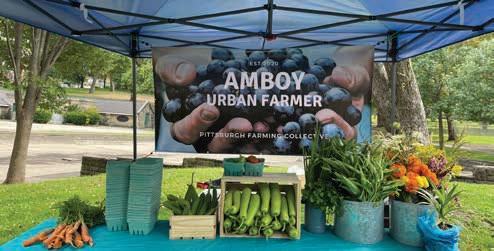
2 minute read
URBAN FARMING

Urban Farming Collective in Pittsburgh
Advertisement
by Martin Miron
Rafael Vencio, of AmBoy Urban Collective, LLC, has a vision for the urban farm-driven collective to serve an accompanying brick-and-mortar location housing a Filipino-focused restaurant, market, bodega and bar. He says, “I hope to bring people of different backgrounds together through the richness and beauty of Filipino food and culture by becoming a successful and sustainable multifaceted urban business. I strive to help close the gap on income and food insecurities in dense urban areas where access and education are scarce by establishing various platforms that enrich cultural diversity and socially driven economies, thus creating a sustainable small business that offers high-quality standards to food and farming professionals in today’s unpredictable economy.” His goal is to establish a permanent location for the collective to design and build a centralized facility for all business operations. Th e start-up will collect historical data and provide a fi nancial identity that is available for others to use via their own background in urban farming to develop a business that will provide enough income to be viable and improve the quality of the urban environment. Rafael Vencio Vencio explains, “I got into farming during the pandemic and I wanted to focus on the sustainability of my work as a lifelong career. When I was an aspiring chef, I remembered an idea I had about a small farm directly producing for a restaurant, and it reminded me of my grandparents, who were farmers in the Philippines. Since I had no prior background in farming, I was fortunate to fi nd a farm incubator within the city.” He started growing mushrooms at home as an introductory to urban farming and then entered for the nonprofi t Hilltop Farm Incubator and program in 2021. Now Vencio grows vegetables that are culturally common in Filipino cuisine on a quarter-acre lot using no-till, highintensity farming, organic methods and a market gardener strategy, complementing that with other Western cultivars that are conducive to this zone or nutritionally signifi cant. He notes, “I scale my farming operations based on three revenue streams of my small business: the farmers market, community supported agriculture (CSA) subscriptions and value-added products, including popup dinner events.” Vencio provides volunteer work, and started the season this year with an intern from Chatham Food studies through the summer. He says, “I sell at the farmers market in Lawrenceville, and will be there on Tuesdays up until early November.”


For more information, visit AmboyUrbanCollective.com.








